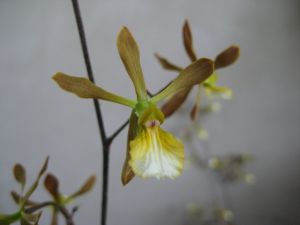imported>Unknown user No edit summary |
No edit summary Tag: wikieditor |
||
| (2 intermediate revisions by the same user not shown) | |||
| Line 1: | Line 1: | ||
[[File:Encyclia_aspera.jpg|thumb|''Encyclia aspera'']] | |||
'''Code:''' E.0x0001, E.0x0002 | |||
'''Common Names:''' Rough-Stalked Encyclia<br /> | |||
'''Scented:''' yes, raspberry/cherry<br /> | |||
'''Light Requirements:''' partial shade<br /> | |||
'''Temperature Requirements:''' hot<br /> | |||
'''Blooms:''' late winter through spring<br /> | |||
'''Flower Size:''' 2.6cm<br /> | |||
'''Synonyms:''' ''Epidendrum asperirachis'' (Garay) A.D. Hawkes 1957; ''*Epidendrum asperum'' Lindl. 1834; ''Encyclia asperirachis'' Garay 1953; ''Encyclia trachypus'' Schltr. 1916 | |||
Found in Colombia, Ecuador and Peru in tropical moist and dry forests as a medium sized, hot growing epiphyte at elevations of 20m to 600m with onion-shaped pseudobulbs carrying 2 to 3 apical, strap-shaped leaves that are conduplicate below into the petiole-like base that blooms in the late winter and spring on a reddish, rough, 105cm long, fractiflex, racemose or paniculate inflorescence with raspberry or cherry scented flowers. This species responds best to a cork mount, given partial sun, high humidity and even watering and fertilizing. | |||
Latest revision as of 16:03, 11 June 2024

Code: E.0x0001, E.0x0002
Common Names: Rough-Stalked Encyclia
Scented: yes, raspberry/cherry
Light Requirements: partial shade
Temperature Requirements: hot
Blooms: late winter through spring
Flower Size: 2.6cm
Synonyms: Epidendrum asperirachis (Garay) A.D. Hawkes 1957; *Epidendrum asperum Lindl. 1834; Encyclia asperirachis Garay 1953; Encyclia trachypus Schltr. 1916
Found in Colombia, Ecuador and Peru in tropical moist and dry forests as a medium sized, hot growing epiphyte at elevations of 20m to 600m with onion-shaped pseudobulbs carrying 2 to 3 apical, strap-shaped leaves that are conduplicate below into the petiole-like base that blooms in the late winter and spring on a reddish, rough, 105cm long, fractiflex, racemose or paniculate inflorescence with raspberry or cherry scented flowers. This species responds best to a cork mount, given partial sun, high humidity and even watering and fertilizing.